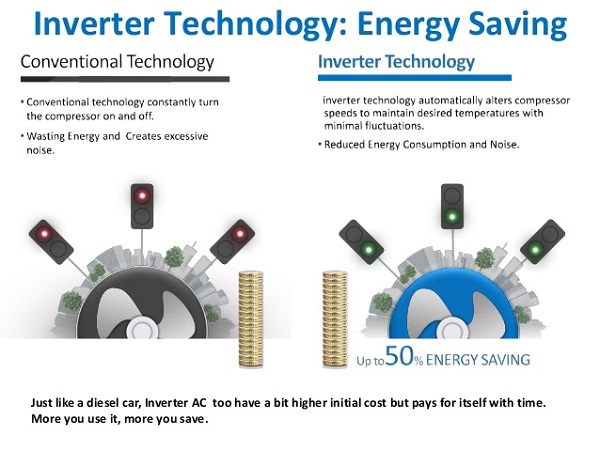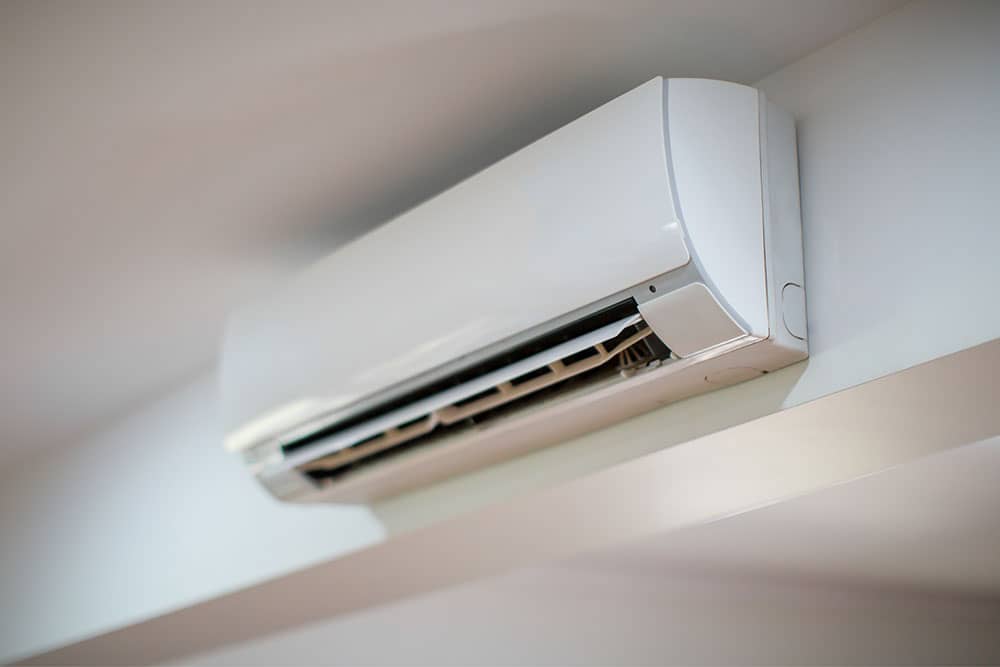For daily comfort, investing in the right air conditioner is crucial. Inverter-technology air conditioners are fast overtaking all other options as the preferred option among households. What does the term “inverter” mean, though, and how can you know if an air conditioner is an inverter?
The complex equipment known as inverter air conditioners use a controlled compressor. If you hear the sound of a changing compressor when you lower the thermostat, you have an inverter unit. The compressor never stops and runs nonstop. When compared to traditional air conditioners, inverter technology is a cutting-edge technology that can reduce energy consumption.
You’ll need an air conditioner that matches your specific needs while also keeping your home cool and comfy. You can better understand the distinction between inverting and non-inverting air conditioners thanks to this article. For the most accurate information possible, keep reading.
Air Conditioners: Inverter vs. Non-Inverter

Modern living need air conditioning. It improves the surroundings’ comfort for the person using them. The most popular options for choosing the best air conditioner for your home or workplace are inverter and non-inverter models.
The functioning and characteristics of the inverter and non-inverter air conditioners are two of their many differences. To choose an air conditioner that suits your needs, budget, and house design, learn the advantages and disadvantages of each.
We will assist you in choosing the ideal air conditioner for your house. The elements to take into account when purchasing an air conditioner are listed below.
1. Speed
To produce the necessary cooling effect, the non-inverter air conditioner uses a start-stop compressor that cycles on and off. Non-inverter motors only run at maximum speed for a short period of time before turning off once the desired room temperature is reached.
The moment the compressor unit shuts off, the room will instantly start to warm up once more. When this happens, the external unit will start running again at full capacity.
The on/off cycle that is repeated makes greater noise and uses more energy. Its power source is uncontrollable, and the compressor’s speed is set.
With inverter air conditioning, the external compressor can accelerate or decelerate. An adjustable-speed compressor is a feature of the inverter air conditioner that enables regulated operation of the compressor to alter the air conditioner’s temperature.
A system using inverter technology begins operating considerably more quickly than one without, and it quickly reaches the desired temperature. Systems using inverters start out operating at a low speed. It uses considerably less energy at launch as a result.
Additionally, since you can now regulate temperatures, cooling is practical. It means that an inverter air conditioner does not have to turn off. Additionally, it can stop the repeated start-stop cycles, improving the appliance’s overall energy efficiency.
These devices are different from those without inverters, which only have a single speed for the compressor. As a result, it can offer the user the best performance.
2. Efficiency
Non-inverter units are less energy-efficient since they randomly turn on and off to maintain a predetermined temperature threshold close to ambient temperature.
A non-inverter air conditioner adjusts its energy output based on the temperature of the room. Its sensor successfully automates the cooling and heating processes by adjusting the power supply automatically dependent on the temperature of the space.
In comparison to non-inverter air conditioners, inverter air conditioners function more efficiently. During the lifespan of the air conditioner, it significantly lowers electricity consumption.
As a result, your system will be durable and you won’t soon need to get a new air conditioner.
To keep the temperature where it needs to be, the compressor accelerates and decelerates. As a result, the compressor is not always running at maximum capacity. As a result, inverter-grade air conditioners use far less electricity than standard air conditioners.
If a temperature adjustment is necessary to achieve the owner’s or user’s preferred level, inverter technology makes the determination. Because of its variable-speed compressor, it is environmentally beneficial and consumes less electricity.
3. Lifespan
Potential buyers are significantly deterred by the air conditioner’s lifespan. The assurance that a product will last for many years is something that people nowadays are becoming more and more concerned with.
The lifespan of non-converters is shorter. The compressor’s lifespan is shortened by the repeated on-and-off cycles, which cause it to run at high power all the time. It puts a lot of strain and wear on everything. As a result, the system can malfunction earlier than expected.
Inverter air conditioning systems, however, have a longer lifespan than non-inverter ones. The system doesn’t have to work as hard because technology is more efficient, which is the secret to its long lifespan.
4. Noise
The compressor is normally either off or on in conventional, non-inverter air conditioning systems, providing silence when it is off and a loud sound when it is operating. The inverter device makes much less noise than the on/off switch does.
You should think about replacing your present air conditioner if it is noisy or increases your electricity bill. You could decide to use inverter air conditioners.
Once the correct temperature is attained, inverters don’t need to turn on and off. Instead, they make little to no noise while continuously changing the temperature.
Because you won’t hear the obtrusive start-up and shut-off noises typical of traditional air conditioners, the inverter-grade air conditioner will be substantially quieter than a conventional air conditioner.
5. Cost
Due to its ability to lower operating costs, improve system reliability, and reduce the need for maintenance, inverter technology for air conditioning units is in high demand.
Instead of continuously stopping and starting, it works to give a continuous flow of heating or cooling, which lowers energy outputs and helps to keep energy levels lower than in non-inverter systems. Comparing inverter systems to non-inverter systems, you might save up to 65%.
The inverter air conditioner may initially cost more than non-inverts, but because of its durability and adaptability, it would be a superb alternative. The pricey inversion air conditioning system is justified by its features.
Do Inverter AC Units Save Energy?

Non-inverter air conditioners frequently start and run at full capacity because of their on/off switch. A standard air conditioner uses a lot of electricity each time it begins.
Continuous operation at maximum capacity will also use a significant amount of electricity.
On the other hand, inverters do not need to continuously function at their maximum capacity or turn on and off repeatedly. They considerably reduce electricity consumption.
Your home’s humidity is also better controlled with the engine running continuously. Another greener option is to install an inverter air conditioner. An inverter air conditioner will also make you more comfortable.
What Are The Drawbacks Of An Inverter AC?

The biggest drawback of inverter air conditioners is their high initial cost, which might be 20 to 25 percent higher than that of traditional air conditioners with equivalent ratings. Additionally, the technology at play is rather new.
Currently, there is little market demand for these air conditioners. Due to its expensive components, it is also overpriced. Inverter air conditioning systems will require more frequent maintenance because of its expensive components and very complicated circuitry.
It is advised to only have the equipment fixed by a specialist from the device’s original manufacturer if a service warranty is not applicable, as this could be expensive. You must decide if you can afford the potential expenditures linked with any potential complications before making a purchase.
Is It Acceptable To Leave The Air Conditioner On Continuously?
Usually, there won’t be any problems if the inverter air conditioner runs nonstop for a few days. The inverter air conditioner should, however, always be turned off when not in use. It will enable you to make significant financial and energy savings.
Energy will be wasted, and you’ll end up paying astronomical electricity bills as a result. However, you are free to use the inverter AC for however long is required.
In Conclusion
The most recent development in air conditioning technology is inverter units. The option that uses the least energy is inverter air conditioning. Even though it is more expensive than other alternatives, it might ultimately save you money and energy.
Though picking a system with the newest technology is usually a good idea, don’t forget to take other factors into account that could affect your choice. It would be great if you took into account aspects like how frequently and in what setting you’ll use the air conditioner.
The non-inverter air conditioner is much less expensive, especially for families who won’t use the air conditioner frequently, even though it is certainly the better investment and the more reliable option.
It is advised that you pick an air conditioner based on your requirements. There are numerous factors to consider when deciding which type of air conditioner to use. However, both inverter and non-inverter AC versions are well-known all over the world because they serve the purpose of keeping you and your family comfortable.






GIPHY App Key not set. Please check settings